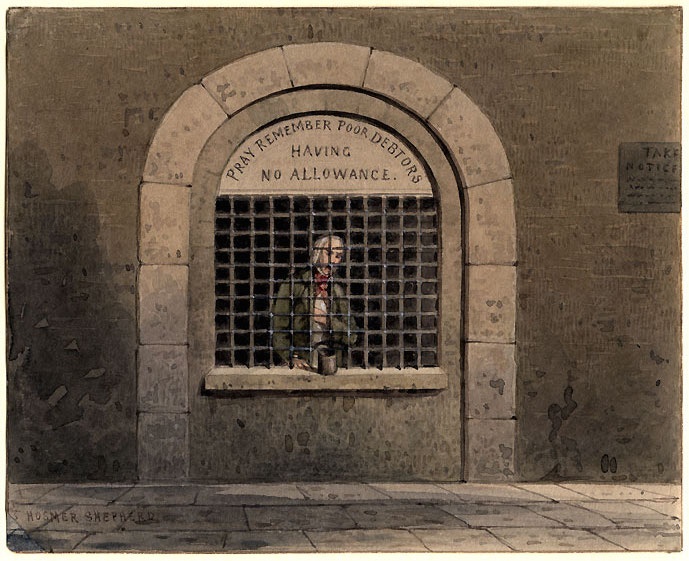INSTITUTE INDEX: Striking a blow against debtors' prisons

Often considered relics of the past, debtors' prisons still exist in the U.S., but lawsuits by civil rights groups are making progress toward shutting them down. (Nineteenth century painting of "A Debtor in Fleet Street Prison" by the English artist Thomas Hosmer Shepherd via Wikimedia.)
Amount that Jennings, Missouri, has agreed to pay out to people jailed because they were unable to pay court fines and fees they owed: $4.75 million
Number of people who will receive payments under the settlement: almost 2,000
Days they collectively spent in jail over the last five years: about 8,300
Month in which Equal Justice Under Law, a civil rights group involved in the Jennings case, filed a federal class-action lawsuit alleging systemic violations of basic human and civil rights in the New Orleans legal system resulting in a modern-day debtors' prison: 9/2015
Percent of government agencies involved in the New Orleans criminal justice system that rely on criminal convictions and high money bonds for funding: 100
Under the part of the system in New Orleans that's drawn the most public outrage, amount per felony charge a judge can assess on individual defendants to fund a judicial expense account that can pay for everything from court staff salaries to coffee: $2,000
Month in which Equal Justice Under Law and the MacArthur Justice Center at the University of Mississippi School of Law filed a federal class-action lawsuit against Jackson, Mississippi, over a forced-labor camp and debtors' prison used by the city: 10/2015
Amount impoverished Jackson residents are able to work off their debt per day at the Hinds County Penal Farm near Jackson: $58
For those unable to work because of age or disability, amount taken off their debt for each day spent in prison: $25
According to the lawsuit, number of Jackson residents who've been incarcerated for nonpayment of debts over the past several years: many hundreds
Year in which Equal Justice Under Law was also involved in a lawsuit that resulted in the city of Montgomery, Alabama, agreeing to change its procedures so people would no longer be jailed for their inability to afford fines and other fees associated with minor traffic violations: 2014
In the case that sparked the Montgomery lawsuit, days an out-of-work grandmother was ordered to serve in jail because she was unable to pay old tickets and the fees charged by a private probation company hired by the city to collect fines: 31
Amount debtors jailed in Montgomery had their debt reduced by for each day spent in jail: $50
Additional amount they were able to reduce their debt by agreeing to perform janitorial tasks such as scrubbing feces and blood from jail floors: $25
(Click on figure to go to source.)
Tags
Sue Sturgis
Sue is the former editorial director of Facing South and the Institute for Southern Studies.
